The Illusion of Choice: An Alpha Protocol Retrospective
by Adam B
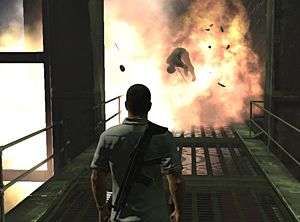 Before its release in June 2010, there was much hype around Alpha Protocol. It promised an espionage-themed, modern-day action RPG with the usual trifecta of engaging gameplay, exciting action and player-driven story. On release, however, it was hailed as something of a disappointment; there were control issues, graphical bugs, AI quirks, a few design problems and the PC version was a bit of a mess (or, more accurately, a lazy port) unless you were willing to put a fair amount of effort into fiddling with ini files. It ended up with scores of 72, 63 and 64 on Metacritic for the PC, 360 and PS3 versions respectively – hardly a ringing endorsement. All that being said, I have played Alpha Protocol through to completion on no less than ten occasions.
Before its release in June 2010, there was much hype around Alpha Protocol. It promised an espionage-themed, modern-day action RPG with the usual trifecta of engaging gameplay, exciting action and player-driven story. On release, however, it was hailed as something of a disappointment; there were control issues, graphical bugs, AI quirks, a few design problems and the PC version was a bit of a mess (or, more accurately, a lazy port) unless you were willing to put a fair amount of effort into fiddling with ini files. It ended up with scores of 72, 63 and 64 on Metacritic for the PC, 360 and PS3 versions respectively – hardly a ringing endorsement. All that being said, I have played Alpha Protocol through to completion on no less than ten occasions.
So, one may very reasonably ask, why have I played through it so many times if it’s seemingly such a mediocre experience? The answer is simple: aside from it actually being pretty fun to play once you make the PC controls usable, you really can have a different experience every time you play it; there are choices that I still haven’t taken in all my playthroughs and I know that those choices will have a genuine and often substantial effect on how the rest of the game plays out. These days every game with RPG elements will claim, to a greater or lesser degree, that your actions as a player will have real consequences in the game, that what you decide to do will directly shape the world around you and, on the whole, it’s a load of bollocks.
Take something like the Mass Effect series, which has a slight variation on your standard alignment system and makes the aforementioned claim, whereby almost all of your choices are binary – good or bad – and whilst there there is some degree of persistence in the way that characters behave towards you based on your actions, most of how they respond comes down to your direct behaviour in conversations with them. The fact that you were a complete dick to the shopkeeper standing next to them and kneecapped him when he wouldn’t give you a discount doesn’t seem to matter to them in the slightest as long as, on balance, you pick the nice conversation options with them – seemingly none of the NPCs ever talk about you when you’re not around.
 What this means is that, for the most part, you can run a very fluid morality, picking a side to suit whatever you think will benefit you most at the time, without any real consequences. This isn’t without its advantages, of course, as it does allow you to be ‘The Good Guy’ for most of the game and still take advantage of the ‘evil’ quick-time events (because they’re always fun to watch and are almost always better then the alternative) but in character, it’s a little strange.
What this means is that, for the most part, you can run a very fluid morality, picking a side to suit whatever you think will benefit you most at the time, without any real consequences. This isn’t without its advantages, of course, as it does allow you to be ‘The Good Guy’ for most of the game and still take advantage of the ‘evil’ quick-time events (because they’re always fun to watch and are almost always better then the alternative) but in character, it’s a little strange.
Alpha Protocol, on the other hand, takes your decisions very seriously. Fail to drop in on your local contact before shooting up a nearby warehouse and he’ll be upset that you carried out an operation on his turf without having the decency to let him know. Make one of the city hubs your first stop and the locals won’t have any idea who you are; go there last and your exploits will be common knowledge among the connected, potentially totally changing the way that they interact with you. Kill off major plot characters (and nearly everyone of note in this game can be killed off) and it could drastically change the way that other people react to you depending on their relationship with the deceased, or make no difference at all if they’d never met and don’t care about them. Want to go in, guns blazing and kill off everyone in sight, including innocent local police and government agents (who will happily kill you, given the chance)? Feel free, but be prepared for people to be appalled by your actions, chastise you for turning into such a monster or even refuse to help you any more because of what you’ve done.
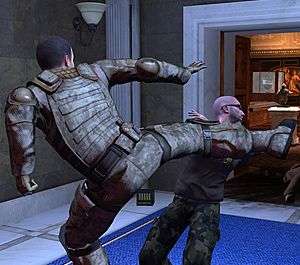 The game puts an interesting twist on the now-traditional dialogue wheel mechanic; your conversation options are always timed, so you really have to pay attention and think on your feet. It does a pretty good job of averting the classic “Talking Is a Free Action” trope, though it doesn’t go so far as to treat a time-out as not saying anything at all and instead picks a “default” option for you. Whilst the options can sometimes be a little ambiguous in the same way as most dialogue wheels-based games and the timers can be a little too short, leading to occasional bouts of screaming “NO! I DIDN’T MEAN THAT! ABORT! ABORT!” at the screen, they rarely railroad you into simple Good/Bad choices, and you’ll nearly always find yourself at a point where you can act like a complete dick towards a key character at a critical moment in the plot just because it’s amusing.
The game puts an interesting twist on the now-traditional dialogue wheel mechanic; your conversation options are always timed, so you really have to pay attention and think on your feet. It does a pretty good job of averting the classic “Talking Is a Free Action” trope, though it doesn’t go so far as to treat a time-out as not saying anything at all and instead picks a “default” option for you. Whilst the options can sometimes be a little ambiguous in the same way as most dialogue wheels-based games and the timers can be a little too short, leading to occasional bouts of screaming “NO! I DIDN’T MEAN THAT! ABORT! ABORT!” at the screen, they rarely railroad you into simple Good/Bad choices, and you’ll nearly always find yourself at a point where you can act like a complete dick towards a key character at a critical moment in the plot just because it’s amusing.
There are several factions in the game that you can choose to ally yourself with (or screw them all and go it alone) and they each have their own preferred way of going about things. Some prefer a stealthy approach, others are fans of brute military force and one of them is just completely insane. Teaming up with someone for a mission and taking the wrong approach will piss them off and they won’t simply have forgotten about it by the start of the next mission – they’ll be reminding you about it until the end of the game.
In addition, your allies aren’t simply shadowy backers who send you out on pointless errands; they help you out on your missions and ultimately they are all your missions to achieve your goals, which is almost unheard of in an RPG; if you don’t want to rescue a captured ally, then you can simply leave them to their fate. Or if you really don’t like them you can go save them just so you can have the pleasure of putting a bullet in their forehead yourself, though they’re unlikely to give you much help after that. In another deviation from the traditional RPG formula, the game is quite happy for you to make things much harder for yourself by killing off or alienating almost everyone that might offer you help, though you’re always left with an option for progression, even if it’s difficult and lonely one.
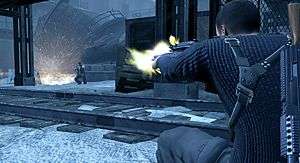 In summary, the reason that I have such a fondness for Alpha Protocol is that everything you do or say, however insignificant, has a real impact on the game world. From little things such as being nice to someone in conversation so that they don’t tip off the guards at your next target, to really significant ones like whether to arrest someone, let them go free or shoot them on the spot – all of which have their own benefits and drawbacks – you’re always having to consider how your behaviour will effect your situation and consider it quickly.
In summary, the reason that I have such a fondness for Alpha Protocol is that everything you do or say, however insignificant, has a real impact on the game world. From little things such as being nice to someone in conversation so that they don’t tip off the guards at your next target, to really significant ones like whether to arrest someone, let them go free or shoot them on the spot – all of which have their own benefits and drawbacks – you’re always having to consider how your behaviour will effect your situation and consider it quickly.
It’s something that very few games have even attempted, let alone succeeded in pulling off and it’s a great shame that its buggy release and lacklustre review scores have put paid to any chance of a sequel. I would happily pay good money for another game that makes me feel that I am genuinely in charge of my avatar’s destiny in the way that Alpha Protocol does and not simply picking from a series of options whose consequences will last approximately as long as the conversation.
Last five articles by Adam B
- Deus Ex: Mankind Divided - Review
- No Man's Sky - Review
- The Curious Tale of The Consoles That Became PCs
- Quality of Life
- Why You Should Be Watching Dota 2 Right Now














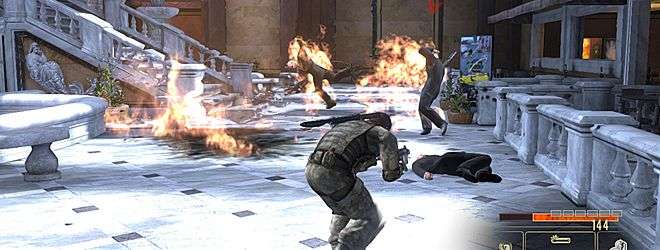
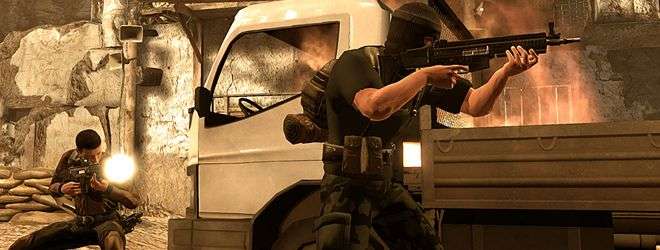





I love the idea behind Alpha Protocol, but I’ll admit I was dissuaded by the litant of average reviews.
I may now have to reconsider that
Just goes to show how much damage a few unfavourable reviews can do to a game. At the same time perhaps the devs should have spent a few extra weeks sorting out the bugs?
Out of interest, have the bugs been fixed or is it still the same?
There was only one patch released which fixed a couple of bugs, but most of the ones that weren’t fixed are pretty minor (on the PC at any rate).
As far as I know, FSAA still doesn’t work properly though.
[...] The Illusion of Choice: An Alpha Protocol Retrospective Posted in Games, Personal – Tagged Alpha Protocol, Awesome, Choice, Games, IT, Musings, Review, Sega SHARE THIS Twitter Facebook Delicious StumbleUpon E-mail ← Farcebook Freem! → No Comments Yet [...]